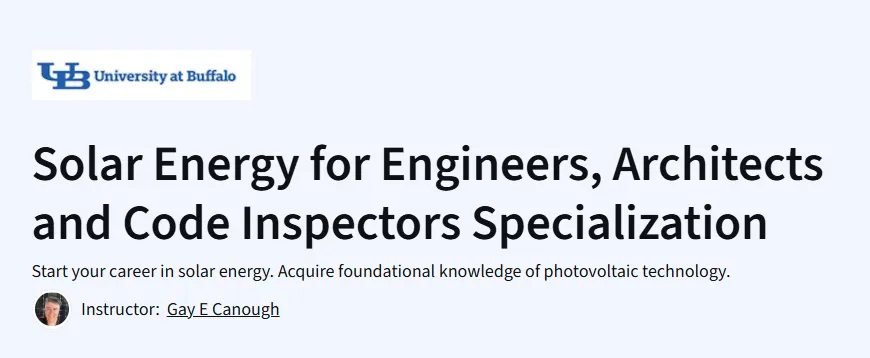What will you learn in Solar Energy for Engineers, Architects and Code Inspectors Specialization Course
Grasp photovoltaic (PV) fundamentals including how solar panels convert sunlight into electricity and system-level design principles.
Analyze PV system components and configurations, from module layout to inverters and mounting strategies.
Conduct site assessments and estimate energy demand and PV sizing based on building data and local climate.
Understand permitting, building codes, financial models (e.g., net metering, PPAs), and economic feasibility of PV systems.
Program Overview
1. Solar Energy Systems Overview
⏳ ~9 hours
Topics: PV system basics, solar irradiance, component anatomy, ROI/cost estimation.
Hands-on: Quizzes and assignments on power calculation and PV yield estimation.
2. Solar Energy and Electrical System Design
⏳ ~17 hours
Topics: PV siting, shading analysis, module/inverter selection, wiring, voltage drop, and system sizing across scales.
Hands-on: Practice quizzes, shading calculations, design projects using real data.
3. Solar Energy Codes, Permitting and Zoning
⏳ ~13–16 hours
Topics: National/state/local PV regulations, inspection workflows, documentation, and compliance processes.
Hands-on: Case-based scenarios simulating plan checks, zoning constraints, and code compliance.
Get certificate
Job Outlook
Equips learners for roles in PV system design, solar installation, systems inspection, and renewable energy consulting.
Applies fittingly to fields like architecture, civil engineering, construction, or sustainability planning.
Provides technical credibility for entry-level careers in solar assessment, site design, or technical sales.
Completion signals foundational understanding required for PV certification pathways like NABCEP.
Specification: Solar Energy for Engineers, Architects and Code Inspectors Specialization
|
FAQs
- Basic understanding of physics and mathematics is helpful but not mandatory.
- The course introduces solar energy concepts from foundational principles.
- Learners gradually understand photovoltaic systems, solar thermal technologies, and design considerations.
- Hands-on examples help learners connect theory to real-world applications.
- Beginners can develop foundational skills in solar energy design and implementation.
- The course covers designing residential and commercial solar energy systems.
- Learners practice system sizing, site assessment, and performance evaluation.
- Safety standards, codes, and regulations are introduced.
- Step-by-step exercises simulate professional solar design and inspection workflows.
- Skills gained are directly applicable to engineering, architecture, and inspection roles.
- Learners explore photovoltaic (PV) and solar thermal system components.
- Software tools for simulation, performance analysis, and design are introduced.
- Practical exercises demonstrate system efficiency calculations and optimization.
- Knowledge gained helps in planning, evaluating, and implementing solar projects.
- Skills are relevant for engineers, architects, and inspectors working with solar energy.
- Solar energy expertise is increasingly in demand in engineering, architecture, and construction industries.
- Knowledge of system design and inspection improves employability for specialized roles.
- Hands-on projects demonstrate practical ability to potential employers.
- Understanding codes, standards, and technologies enhances professional credibility.
- Completion shows readiness to contribute to solar energy projects and renewable energy initiatives.
- Estimated completion is around 4–6 months at a part-time pace.
- Weekly effort of 4–6 hours is generally sufficient for lectures and exercises.
- Regular practice in system design, simulation, and evaluation reinforces learning.
- Revisiting exercises or exploring advanced design tools may require extra time.
- Consistent engagement ensures learners develop both conceptual understanding and practical solar energy skills.





